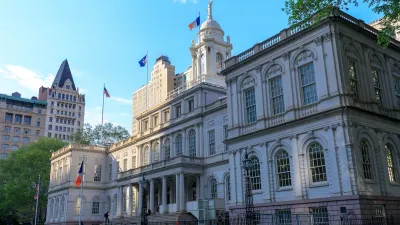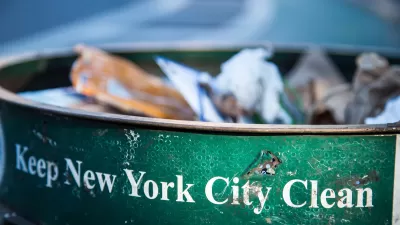SoHo, a Manhattan neighborhood full of luxury apartments and a median income of $111,000/year, must accept a new facility that includes a garage for sanitation trucks. Why, and how will it test the city's commitment to infrastructure design?
A core environmental justice fight has long been the fair distribution of necessary nuisance uses throughout a city. Poor neighborhoods tend to be over-burdened with unpleasant parts of public infrastructure like bus depots and sewage plants, with cumulative negative effects on resident health and quality of life.
Often activists in these over-burdened neighborhoods band together to fight the location of yet another of these kinds of facilities, which leads to inevitable labeling of them as just naysayers and exchanges like, "Well where should they go?" "How about the rich neighborhoods take their share?" "Yeah, like that will happen."
In New York City, former Mayor Bloomberg apparently decided to make it happen, roughly, with a solid waste plan that at least declares that each of the city's five boroughs should take adequate responsibility for its own trash. And current Mayor DeBlasio is sticking with the plan.
This means, as CityLab's Aarian Marshall recently reported, that SoHo, a Manhattan neighborhood full of luxury apartment towers and a median income of $111,000/year, has been forced to accept, despite protest from some very wealthy and powerful people, a large building that includes a garage for sanitation trucks.
FULL STORY: Rich Neighborhood in NYC Actually Gets a “Noxious” Use

Alabama: Trump Terminates Settlements for Black Communities Harmed By Raw Sewage
Trump deemed the landmark civil rights agreement “illegal DEI and environmental justice policy.”

Study: Maui’s Plan to Convert Vacation Rentals to Long-Term Housing Could Cause Nearly $1 Billion Economic Loss
The plan would reduce visitor accommodation by 25% resulting in 1,900 jobs lost.

Planetizen Federal Action Tracker
A weekly monitor of how Trump’s orders and actions are impacting planners and planning in America.

Waymo Gets Permission to Map SF’s Market Street
If allowed to operate on the traffic-restricted street, Waymo’s autonomous taxis would have a leg up over ride-hailing competitors — and counter the city’s efforts to grow bike and pedestrian on the thoroughfare.

Parklet Symposium Highlights the Success of Shared Spaces
Parklets got a boost during the Covid-19 pandemic, when the concept was translated to outdoor dining programs that offered restaurants a lifeline during the shutdown.

Federal Homelessness Agency Places Entire Staff on Leave
The U.S. Interagency Council on Homelessness is the only federal agency dedicated to preventing and ending homelessness.
Urban Design for Planners 1: Software Tools
This six-course series explores essential urban design concepts using open source software and equips planners with the tools they need to participate fully in the urban design process.
Planning for Universal Design
Learn the tools for implementing Universal Design in planning regulations.
Caltrans
Smith Gee Studio
Institute for Housing and Urban Development Studies (IHS)
City of Grandview
Harvard GSD Executive Education
Toledo-Lucas County Plan Commissions
Salt Lake City
NYU Wagner Graduate School of Public Service





























